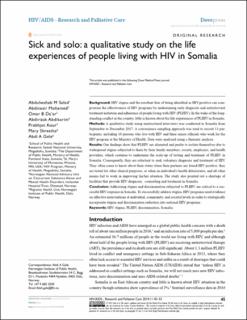| dc.description.abstract | Background: HIV stigma and the resultant fear of being identified as HIV-positive can compromise the effectiveness of HIV programs by undermining early diagnosis and antiretroviral treatment initiation and adherence of people living with HIV (PLHIV). In the wake of the longstanding conflict in the country, little is known about the life experiences of PLHIV in Somalia. Methods: A qualitative study using unstructured interviews was conducted in Somalia from September to December 2017. A convenience sampling approach was used to recruit 13 participants, including 10 persons who live with HIV and three senior officials who work for the HIV program at the Ministry of Health. Data were analyzed using a thematic analysis. Results: Our findings show that PLHIV are alienated and prefer to isolate themselves due to widespread stigma subjected to them by their family members, society, employers, and health providers, which continue to undermine the scale-up of testing and treatment of PLHIV in Somalia. Consequently, they are reluctant to seek voluntary diagnosis and treatment of HIV. They often come to know about their status when their partners are found HIV positive, they are tested for other clinical purposes, or when an individual’s health deteriorates, and all other means fail to work in improving his/her situation. The study also pointed out a shortage of facilities that provide HIV diagnosis, counseling and treatment in Somalia. Conclusion: Addressing stigma and discrimination subjected to PLHIV are critical to a successful HIV response in Somalia. To successfully address stigma, HIV programs need evidence on effective interventions at individual, community, and societal levels in order to strategically incorporate stigma and discrimination reduction into national HIV programs. | |
